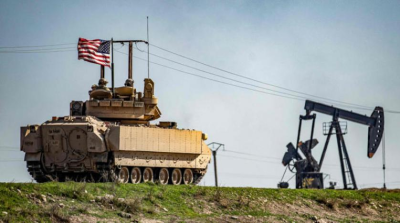NOVANEWS
As Obama continues to “weigh” airstrikes, anti-war critics demand honest accounting of previous fiasco

Prime Minister Nouri al-Maliki has indicated he won’t step down as a pre-condition for U.S. airstrikes. (Credit: flick / cc /United States Forces Iraq)As the latest reporting from both Baghdad and Washington, D.C. reveal diplomatic machinations paving the way for possible U.S. airstrikes in Iraq, increasing numbers of peopleare asking President Obama—and the American people—to look at the repeated and failed policy of military intervention in the region as the best argument against making the same mistake yet again.
Following members of the Iraqi government on Wednesday making official requests for U.S. airstrikes to combat the military advances of the Islamic State of Iraq and the Levant (ISIL),rumblings in Washington suggest that one of the pre-conditions for such support would be the resignation of Iraq’s current Prime Minister Nouri al-Maliki.
As the Guardian reports:
Dianne Feinstein, the chair of the Senate intelligence committee, told a hearing on Wednesday that Maliki’s government “has got to go if you want any reconciliation”, and Republican John McCain called for the use of US air power but also urged Obama to “make very clear to Maliki that his time is up”.
The White House has not called for Maliki to go but spokesman Jay Carney said that whether Iraq was led by Maliki or a successor, “We will aggressively attempt to impress upon that leader the absolute necessity of rejecting sectarian governance.” The US secretary of state, John Kerry, said Washington was focused on the Iraqi people, not Maliki.
So far, Maliki has reportedly rebuffed criticisms that his sectarian-style of rule has contributed to the marginalization of Sunni community members, from which ISIL is now drawing most of its support and legitimacy. A spokesman for Maliki on Thursday said he would not stand aside.
At the beginning of the week, President Obama moved an aircraft carrier battle group into the Persian Gulf and on Tuesday ordered nearly 300 combat-ready troops to the country. But even as events on the ground and within high-level political arenas move rapidly, the chorus of those urging against further U.S. military action continues to raise its strong objections.
In a previewed segment of an interview with Bill Moyers, combat veteran and military historian Andrew Bacevich rejects the idea that additional armed intervention in the Middle East can actually help solve the current crisis.
“If you think back to 1980,” Bavevich tells Moyers, “and just sort of tick off the number of military enterprises that we have been engaged with in that part of the world, larger and small—Beirut, Afghanistan, Iraq, and on and on—and ask yourself, ‘Is the region becoming more stable? Is it becoming more democratic?'”
The answer to those key questions, says Bacevich: “No and no.’
Writing for the Guardian, columnist Seamus Milne takes on the argument made by people like Sen. John McCain, other war hawks and the neoconservatives who led the country to war in 2003 that what caused the current crisis in Iraq was the 2011 withdrawal of U.S. troops. In a piece that argues “more US bombs and drones will only escalate Iraq’s horror,” Milnewrites:
The idea that this horror story can be disconnected from the US-led military occupation of Iraq that preceded it, as the war’s apologists still try to maintain, is an absurdity. It’s not just that there was no al-Qaida or Isis in the country before the invasion, or that the occupiers deliberately dismantled the Iraqi state and army and destroyed the country’s infrastructure in the process. It’s that colonial divide-and-rule sectarianism was deliberately fostered from the first day of the occupation.
Not only was a religious and ethnic carve-up enforced across public life, but US commanders were directly involved in sponsoring an El Salvador-style dirty war of sectarian death squads to undermine the armed resistance.
Maliki was himself selected by the US as a suitable strongman to protect its interests. That’s not to suggest that any transition from Saddam’s dictatorship wouldn’t have been painful, or that Iraqis have had no agency in what took place. But much of the western debate of the past week has glossed over the scale of the human and social catastrophe unleashed by the US-led war.
Looking at the financial and social costs of the last U.S. war in Iraq, Doug Hall, executive director of the National Priorities Project, presents numbers that estimate the combat costs of the invasion in 2003 and subsequent occupation at more than $800 billion and other economists have put the total long-term costs in the trillions.
“With our domestic economy still struggling, our veterans in dire need of care and support, and millions of people struggling to make ends meet at home, we can’t afford to sink more taxpayer dollars into renewed combat operations,” said Hall on Thursday. “The President and Congress must look for ways to be helpful in the Iraq crisis that don’t involve combat operations and the cost to our nation that goes along with them.”
Meanwhile, the editors at the The Nation made their case against U.S. airstrikes on Wednesday by rejecting much of the current mainstream debate and, like Bacevich, asking readers to look at the history of U.S. involvement in Iraq stretching back more than three decades. They write:
The stunning military advance into cities in northern and central Iraq by an Al Qaeda offshoot, the Islamic State of Iraq and Syria—backed by some of Iraq’s Sunni tribal paramilitary forces and a militia tied to remnants of the deposed Baath party—compounds Iraq’s long-running tragedy. For thirty-four years—through the Iran-Iraq War (1980–88), the Gulf War (1990–91), the brutal US-led sanctions against Iraq (1990–2003) and the devastation that followed the US invasion in 2003—Iraq’s people have suffered unspeakably. Now the ISIS-led offensive is adding to that suffering. In seizing Falluja, Mosul and a string of other cities, ISIS has left devastation and mass executions in its wake, and it is aggressively provoking a revival of the Sunni-versus-Shiite civil war that left thousands dead between 2005 and 2008.
But American military involvement in the latest eruption in Iraq, reportedly under consideration by President Obama, would be the wrong response to that suffering, morally and strategically. Even if limited to airstrikes, whether from F-16s, cruise missiles or drones, military action by Washington would almost certainly kill civilians, especially since ISIS is concentrated in heavily populated cities. Worse, such action would inflame, not ease, Iraq’s sectarian divisions, allying Washington more closely with Prime Minister Nuri Kamal al-Maliki’s monumentally corrupt and sectarian regime and against a seething Sunni population, and would send recruits streaming into ISIS’s camp.
As Milne concludes, “The entire Arab world is living with the fallout from a century of attempts to control their region and resources. More intervention will only deepen the crisis.”



